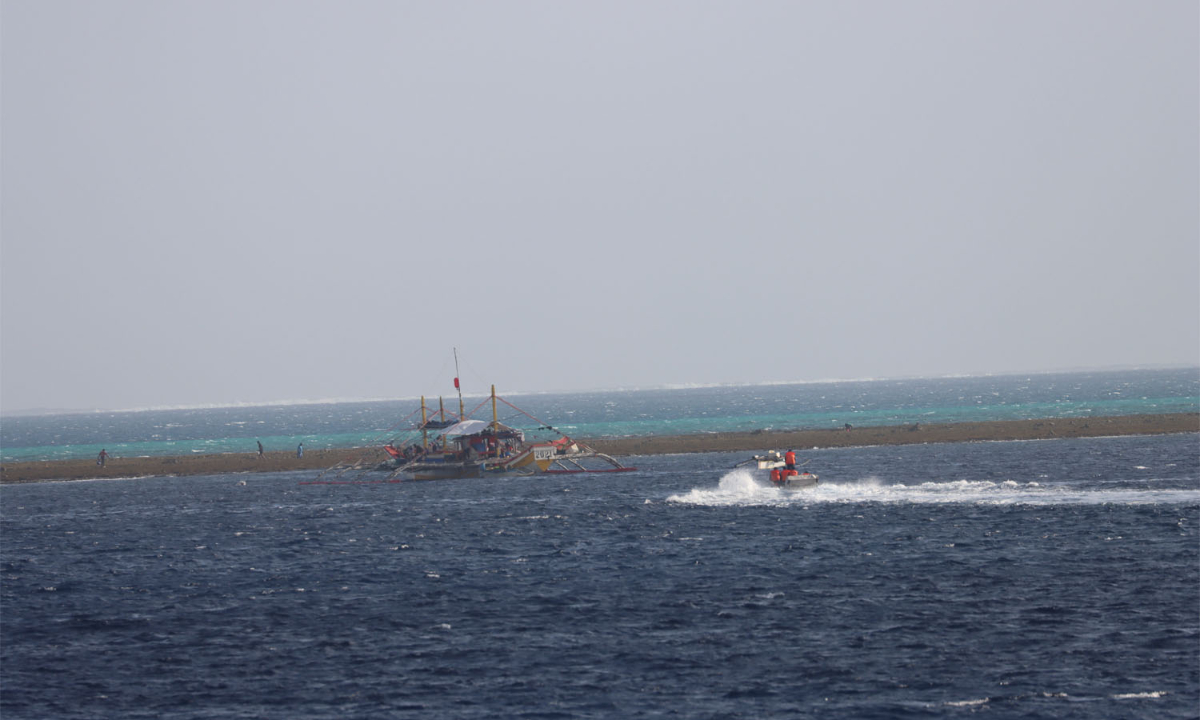
A law enforcement boat released by China Coast Guard ship 3104 gives verbal warnings and dispel the Philippine personnel from the reefs of China’s Huangyan Dao on January 12, 2024. (File photo)
The China Coast Guard (CCG) announced on Sunday that it had expelled a Philippine Coast Guard vessel that illegally intruded into waters adjacent to Huangyan Island in the South China Sea multiple times from February 2 to 9, noting that China's responses were professional and reiterating its firm resolve to safeguard China's national sovereignty.
Experts said that the Philippines' deliberate provocations around the Chinese Lunar New Year are intentional, and the move would not bring any benefit but will further erode mutual trust, disrupt the political atmosphere, and even affect the perception of Chinese people toward the Philippines.
Gan Yu, spokesperson for the CCG said Philippine Coast Guard vessel 9701 illegally intruded into the waters adjacent to Huangyan Island multiple times from February 2 to 9, despite warning calls from the CCG. The CCG took measures to control the course of the Philippine vessel and forcefully drove it away, handling the situation in a professional manner and in according with norms.
China has indisputable sovereignty over Huangyan Island and its adjacent waters. The CCG will as always carry out law enforcement activities in waters under China's jurisdiction and resolutely safeguard China's national sovereignty and maritime rights and interests, Gan said.
Ding Duo, deputy director of the Institute of Maritime Law and Policy at the China Institute for South China Sea Studies, told the Global Times that the move showed the Philippines not only refuses to give up its illegal claims to Huangyan Island, but also aims to take advantage of China's traditional holiday season to gain more benefits at sea.
"But apparently, the Philippines failed to gain any benefit. No matter what approach the Philippines takes, and regardless the timing it takes, China is always on high alert," Ding added.
On January 17, Assistant Foreign Minister Nong Rong co-chaired the Eighth Meeting of the China-Philippines Bilateral Consultation Mechanism on the South China Sea (BCM) with Undersecretary of the Department of Foreign Affairs of the Philippines Maria Theresa P. Lazaro in Shanghai. The two sides reaffirmed that the South China Sea dispute is not the entirety of bilateral relations and believe that maintaining communication and dialogue is essential to maintaining maritime peace and stability.
But following the BCM, the Philippines has continued to provoke and stir up trouble. Ding said that after the new administration came to power in the Philippines, it adjusted its South China Sea policy and China policy, highlighting its speculative and gambler mentality, while breaking the mutual understanding between the two sides in terms of maritime operations.
On the same day, the Philippine Coast Guard accused Chinese vessels of "dangerous" maneuvers. Experts said this is Manila's strategy of manipulating the public opinion, a tactic just like how it has been accusing China of bullying.
During former Rodrigo Duterte's era, China and the Philippines reached a consensus on shelving the decision of the so-called South China Sea arbitration, and made temporary arrangements regarding Philippine fishermen fishing in the waters near Huangyan Island, demonstrating a certain level of understanding between the two sides in handling maritime frictions while taking care of the big picture of the bilateral relationship, Ding told the Global Times.
But the temporary arrangements have conditions, such as Philippine fishing boats not entering the lagoon within Huangyan Island. The conditions reflect China's sovereignty and jurisdiction over Huangyan Island while the agreements demonstrate goodwill toward the Philippines, Ding added.
Over the past months, the Philippine side has been attempting to break the consensus. In September 2023, a vessel of the Bureau of Fisheries and Aquatic Resources of the Philippines, without China's permission, intruded into the adjacent waters of Huangyan Island and attempted to enter its lagoon.
In December, in disregard of the warnings of the CCG vessels, a Philippine vessel went headlong toward Ren'ai Jiao's lagoon and dangerously rammed a CCG ship on the scene.
Chen Xiangmiao, director of the World Navy Research Center at the National Institute for South China Sea Studies, told the Global Time that the Philippines no longer adheres to the tacit understanding between the two countries. They not only fish in the nearby waters of Huangyan Island but also attempt to break through the limit by fishing boats, government vessels, and even coast guard vessels.
In response, China has taken forceful measures to safeguard its rights while making efforts through various means to encourage the Philippines to return to the correct track of managing maritime disputes and avoiding the escalation of crises through negotiation and consultation. These measures also demonstrate China's determination and red lines in safeguarding its territorial sovereignty in the South China Sea, Ding said.
"China will never allow the Philippines to cross the red line. Be it fishing boats, government vessels, or coast guard ships, none will be allowed to enter the lagoon of Huangyan Island. Moreover, China will never allow the Philippines to repeat their old tricks and gain control of Huangyan Island by grounding their vessels. And China will never tolerate a repeat of the 2012 Huangyan Island incident," Chen told the Global Times.
In April 2012, the Philippines sent a warship to harass 12 Chinese fishing vessels which sailed into the waters of Huangyan Island to shelter from bad weather.
